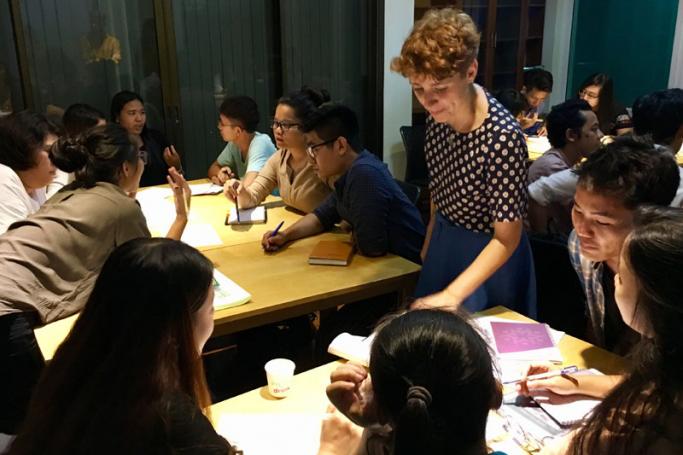The third rounds of talks in the Panglong Peace Conference, initially scheduled for early May this year, are set for this month. Meanwhile, thousands of civilians in Kachin State have been displaced from their homes as a result of renewed fighting between the Tatmadaw and the Kachin Independence Army.
Myanmar’s peace process appears to be suffering a bout of stagnation. For many citizens this is utterly disappointing, especially considering the reassurances made by Aung San Suu Kyi shortly after her NLD government came into power in 2015 that peace would be her priority.
“We think that there is not enough political will on the part of some key stakeholders. All stakeholders participating in the process need to be pragmatic, not just one or two groups,” said Saw Myo Min Thu, Executive Director of Thabyay Education Foundation which is behind the newly-established Peace Leadership and Research Institute.
The Peace Leadership and Research Institute (PLRI) aims to produce a new generation of young, engaged researchers in a bid to improve decision-making in the peace process and in policy making. PLRI, is the newest branch of Thabyay Education Foundation which is made up of a host of educational projects giving youths of diverse ethnic groups access to education, social studies, leadership skills and scholarship opportunities.
Citing a lack of research in policy-making by the government bodies, Saw Myo Min Thu said he and his colleagues were encouraged to establish an institute that would produce citizens who could use research to help the governments make more informed decisions.
“We really think the Myanmar peace negotiation process can benefit a lot more from critical reasoning and evidence-based arguments,” said Saw Myo Min Thu. “Without research skills, the country’s future policy making is at risk. We want to do what we can to fulfil this critical need.”
PLRI’s first intake included 22 fellows from nine different states and regions of Myanmar and the first classes began on June 21st. Fellows sit down to a year-long course which will grant them a Research Diploma in Peace Leadership. During the course they will undergo high-level training in research skills, peacebuilding and conflict resolution. For the first four months of the course, the fellows will focus on intensive classroom-based learning centred on research methodologies. In the second section of the course, fellows will gain skills in leadership and technical and professional skills. At this stage they will begin to work on situation reporting with a focus on a peacebuilding case study from Myanmar. The final four months will see fellows using skills and knowledge learned to develop a research paper with guidance from the course instructors.
Unlike any other research course in the world, it will be tailored to be directly relevant to the Myanmar peace process and fellows will attend seminars arranged by PLRI with international experts of different relevant fields. As well as the leadership from Thabyay Education Foundation, instructors from Slovakia and Canada with strong experience in research education will guide the fellows through the course.
“Our goal is that, at the end of the programme, these fellows will be able to conduct research and make their recommendations based on their findings when they approach conflict resolution and peacebuilding,” said Saw Myo Min Thu.
Fellows attending the course have been chosen from a diverse range of backgrounds and ethnicities, including ethnic groups and areas that have been directly affected by conflict for decades: Shan, Mon and Chin States, Thanintharyi, Sagaing and Ayeyarwaddy Regions including three fellows from recent conflict areas, Kachin and Rakhine States. The complex nature of the ethnic make-up of Myanmar’s population makes it even more important for a diverse range of voices to be heard and contributions to be made in the area of policy-making and peacebuilding.
Regarding the necessity of a diverse range of participants, PLRI’s Programme Coordinator and instructor James MacMillan said, “We believe our institute can act as a microcosm of the larger Myanmar society and provide a valuable space to debate and negotiate the issues that faces the peoples of the country.”
While Myanmar has a small number of independent research organisations, there appears to be a lack of in-country training for researchers, especially in the field of peacebuilding. According to Saw Myo Min Thu, it takes considerable dedication of time and resources as well as international partners to support the activities. For this institute, The Joint Peace Fund a Myanmar-based internationally funded organisation, provides essential financial support.
“It takes a lot of support from our international partners. We are thankful to all of them. The biggest challenge is that this is not a short term project. This is something we will need to do long term. It will take time and a lot of resources to train and nurture quality researchers with deep and practical interests in Myanmar peace process.”
Despite the challenges of getting a new kind of institute up and running here in Myanmar, this course has been established ‘out of necessity’ to bring about an informed and effective generation of research leaders capable of contributing their skills and findings in the hope of seeing an end to violent conflict and in support of a real and peaceful democracy for Myanmar.
“We hope that the graduates will directly contribute to the peace process by participating within their respective capacity. They will be able to provide much-needed critical analysis of the peace process and positively contribute by lending their technical research skills to those who are negotiating in the front and centred roles.”
You are viewing the old site.
Please update your bookmark to https://eng.mizzima.com.
Mizzima Weekly Magazine Issue...
14 December 2023
Spring Revolution Daily News f...
13 December 2023
New UK Burma sanctions welcome...
13 December 2023
Spring Revolution Daily News f...
12 December 2023
Spring Revolution Daily News f...
11 December 2023
Spring Revolution Daily News f...
08 December 2023
Spring Revolution Daily News f...
07 December 2023
Diaspora journalists increasin...
07 December 2023
Myanmar-India border gate to reopen












